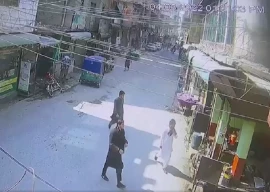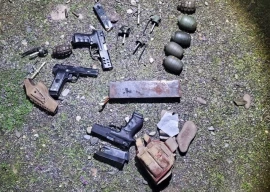
On 4th March, a suicide bomber killed more than 60 worshipers and injured 200 others at a Shia mosque in Peshawar. Once again, ISIS claimed responsibility for the heinous act. This was one of the deadliest attacks since the July 2018 terrorist assault in Quetta by ISIS, which killed nearly 149 people. The attack is a reminder that Pakistani mosques and other public places are not safe and are vulnerable to acts of periodic terrorism because of the non-implementation of the National Action Plan (NAP). On 9th March, Liaqat Baloch, the Central Secretary General of Milli Yakjehti Council, urged the federal government to implement NAP to avoid further terrorist attacks.
Loss of innocent lives and targeting worshippers on sectarian grounds cannot be condoned. It raises the question of why the state has failed to rein in the forces that have gained an impetus since the installation of the Taliban regime in Kabul. Back in 2014, when Tehreek-e-Taliban Pakistan (TTP) launched a terrorist attack on the Army Public School (APS) in Peshawar, the state reacted by launching NAP, declaring zero tolerance on violent and terrorist acts. However, the attack in Quetta in 2018 was not followed up with the same vigour and it appears that the mayhem at the Peshawar mosque will meet the same fate. The attack on the Peshawar mosque should be an eye-opener for those who felt confident that the Taliban regime in Afghanistan will provide a helping hand to Pakistan in eradicating threats of terrorism emanating from the neighbouring country and that Afghan soil will not be used against Pakistan.
For the last three decades, terrorism is one of the major problems faced by the Pakistani people because of frequent suicide attacks. Unfortunately, only rhetorical and superficial measures have been taken. To eradicate this menace effectively, the roots of terrorism – i.e. extremism, intolerance, the radicalisation of youth, militancy and violence – need to be cut. We have remained unable to liquidate the forces involved in the killing of innocent people. Despite heavy investment, law enforcement agencies have failed to fulfil the task, which needs to be examined thoroughly. Every year billions of rupees are spent on security and for preventing terrorism, however, we have yet to witness any positive results.
After the 9/11 attack, the strategy to counter terrorism gained momentum because of the global implications. Also, there was a surge in suicide attacks in the name of Islam and targeting those having a different sectarian, communal and religious way of life. Pakistan experienced colossal physical and material destruction because of the so-called US-led war on terror. However, the state failed to confront the forces that received support from the rogue elements present within and continued their evil acts. For example, Ehsanullah Ehsan, who was a spokesman for the TTP and Jamaat-ur-Ahrar (JuA), confessed to his involvement in the APS massacre via televised recording. He managed to escape from the custody of a spy agency in February 2020. Then Federal Minister for Interior, Ijaz Shah, confirmed his escape but refused to divulge how he escaped. Those responsible for the captivity of Ehsan failed to prevent his escape. On 6th February, in an audio message, Ehsan claimed that he surrendered to authorities under an agreement that he would be guaranteed immunity from prosecution and monthly stipend, adding that he escaped after he was imprisoned along with his children. One wonders how he managed to escape from what is supposed to be a very strict captivity; this is something that does raise a question mark on the country’s counter-terrorism efforts under NAP.
The 4th of March terrorist attack in Peshawar must be taken seriously because of two main reasons.
One, Pakistan has long been placed on the Financial Action Task Force’s (FATF) grey list. FATF’s decision to penalise Pakistan was termed unfair because Pakistan has complied with 26 out of 27 points of the action plan to monitor terror financing and money laundering. However, the FATF decided to keep the country on the grey list for another four months. The grey list restrictions will cause grave problems for genuine Pakistani account holders for remitting and receiving remittance from abroad. Given Pakistan’s weak economy, political instability and a history of active terrorist organisations, Islamabad has little choice but to comply with the FATF’s demands. Although Pakistan has managed to prevent terror financing, the damage has been done and the brunt must be borne when dealing with FATF.
Two, we cannot underestimate the large number of those who justify violence, terrorism and suicide attacks carried out by extremist religious groups. The policy of appeasement in dealing with the groups like TLPand TTPis a major reason behind continued violence and terrorism in Pakistan. When killings in the name of religion are applauded and the state turns a blind eye, how can one expect violence and terrorism in the country to recede? Terrorist acts will continue to take place in Pakistan unless the state liquidates those who are responsible for taking the law in their hands and killing and injuring people based on their faith and their way of life. Without an enlightened society, quality education, tolerant approach to accept dissent, economic and social development, and empowerment of women, Pakistan cannot get rid of groups and parties that use religion for political purposes.
Like Opinion & Editorial on Facebook, follow @ETOpEd on Twitter to receive all updates on all our daily pieces.


1719660634-1/BeFunky-collage-nicole-(1)1719660634-1-165x106.webp)

1732276540-0/kim-(10)1732276540-0-165x106.webp)










COMMENTS (3)
Comments are moderated and generally will be posted if they are on-topic and not abusive.
For more information, please see our Comments FAQ